TMW #077 | Google’s new chapter in web analytics, declining marketing budgets, and HubSpot’s plan to finance the creator economy
Welcome to The Martech Weekly, where every week I review some of the most interesting ideas, research, and latest news. I look to where the industry is going and what you should be paying attention to.
👋 Get TMW every Sunday
TMW is the fastest and easiest way to stay ahead of the Martech industry. Sign up to get the full version delivered every Sunday for this and every TMW, along with an invite to the TMW community. Learn more here.
Here’s the week in Martech:
● Google’s new chapter in web analytics
● Declining marketing budgets
● HubSpot’s plan to finance the creator economy
● Everything else: Adobe enters the metaverse, the death of passwords, our moral obligation to data accessibility, the future of fashion technology, the state of customer services, the billion-dollar browser, using AI to build apps, and renaming cookies.
✍ Commentary
A new chapter in web analytics. I started my career watching Google Analytics training videos. They were seriously dated, but surprisingly comprehensive and an easy way to understand how measurement on the internet works. Most importantly it was free and came with website analytics software I could use without having to pull out a credit card. Google Analytics in many ways democratized data collection and created one of the most ubiquitous B2B SaaS products on the web, making the ability to analyze website performance in arms reach for millions of people.
Today, that picture is changing.
Over the past few weeks, my social feeds have been filled with complaints about a new chapter for Google Analytics – the transition from GA3 to GA4. This is a somewhat significant change in how data is collected and managed in the platform, requiring businesses to completely re-platform to the new version and embrace a totally new data architecture.
The forced cut over to Google Analytics 4 represents the entire online analytics supply chain changing around us, marking one of the most significant periods of internet history. Companies are both becoming more mature in how they measure but are also becoming more concerned about protecting the privacy of their customers. GA4 seemingly is working towards both aims, a more private web analytics software that is more geared towards apps and products.
The most interesting thing about Google Analytics is how it changed the web analytics market. What Google did to publishing it also did to data. What I mean by this is that Google was a significant technological contributor to shaping the internet we have today and this also includes how we think about the data we collect and analyze from websites.
Google’s search product created an expectation in the consumer’s mind that almost any piece of information should be instantly accessible and free. By doing so, over time this disrupted the entire media industry. Scott Galloways put it this way – “the worst business decision across print media firms of the last 50 years was to let Google access our data.” By creating the conditions that gave rise to a new value exchange for content, something that was previously paid for in the old economy is now expected for free. Google created an extractive ecosystem designed to collect as much personal data as possible for advertising products.
Google also did this to how we approach the software we use to measure the effectiveness of our websites. Driven by delivering value to advertisers, Google acquired Urchin in 2005 and rebuilt it as a free analytics tool that quickly became one of the company’s most successful products by sheer user adoption and retention. Google Analytics is not just another app, it’s the way most of us think about website data.
Something that I wished analysts asked more often is why would Google invest significant resources in a free product like Google Analytics? There are two answers to this question. The first is clearly to collect more data to feed the company’s vast treasure trove of targeting options across their advertising products in a deeper sense than what a website crawler does for Google Search. With the platform installed on your website, Google sees far deeper into websites and their visitors, further enriching an already immense data asset.
The second, and most important reason is to establish a way of thinking about web analytics for marketers that is highly aligned to advertising. The purpose of Google Analytics was to educate business website managers and normalize how Google sees the world in terms of internet data. The product literally popularized concepts like bounce rate, page views, and conversion rate and cemented our understanding of online channels through its default groupings of various traffic referrers like social media or email. You can’t really work in the digital analytics industry without understanding Google Analytics.
Analytics products are incredible retention machines. It’s extremely painful to move to a new platform because the value of the product is about gaining a historical view of website performance and insight. Switching to something else breaks the historicity and the value of a consistent view. It’s in this way that many even enterprise brands still use Google Analytics because of Google’s ability to integrate its own advertising products into the system and do things like attribute ad campaigns to onsite events like sign-ups and conversions. This creates the kind of vendor lock-in that’s rare to see anywhere else.
If you’re running ads on Google, then using Adobe Analytics to manage attribution and performance measurement creates more work for integration and data matching between platforms. Most brands run campaigns on Google, creating a virtuous flywheel of education, product awareness, data collection and advertising spending.
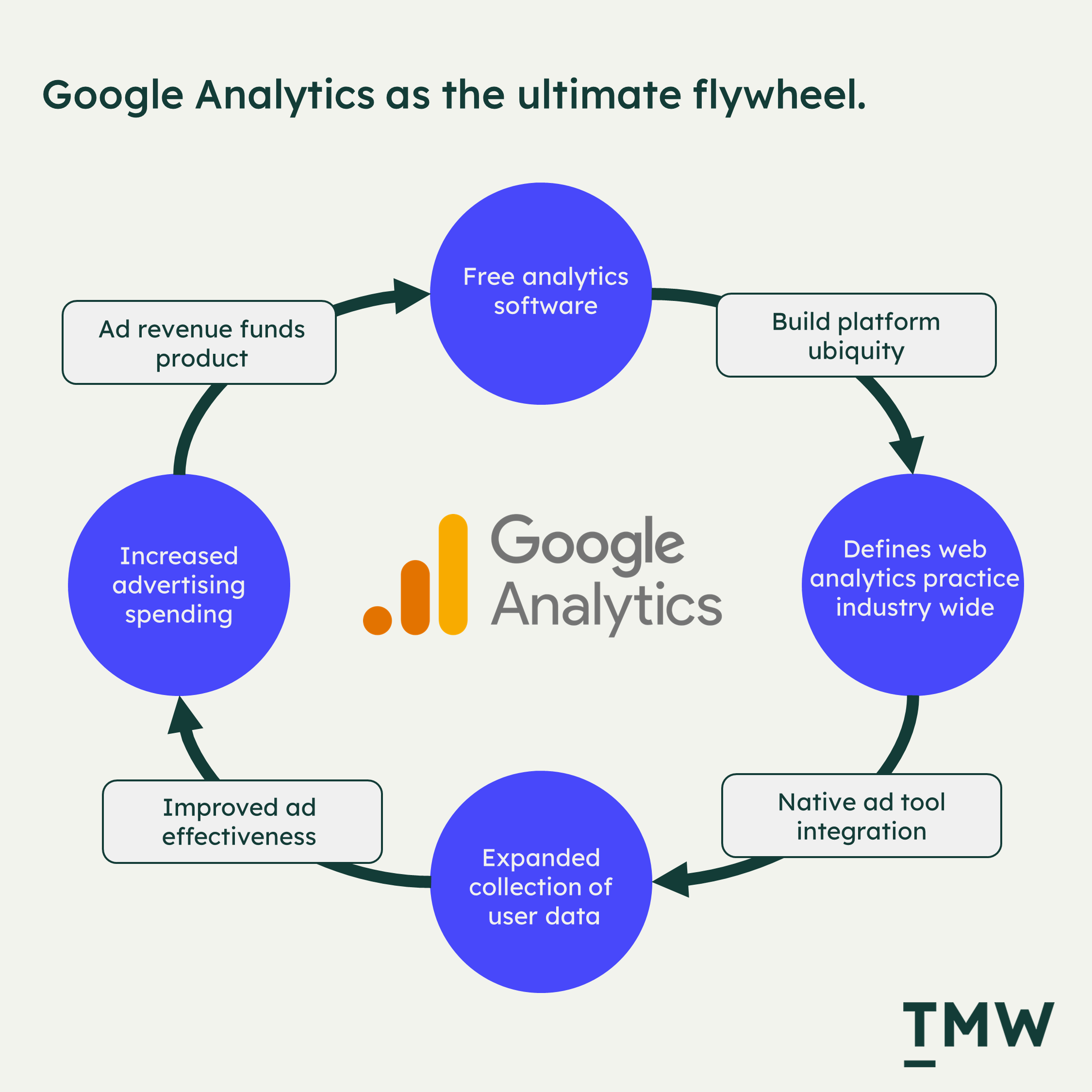
This is why Google’s forced transition to GA4 is such a big deal. The next iteration of Google’s internet-defining analytics tool breaks ties with previous versions in several ways. The most significant is the bold move to cut data flows from GA3, meaning that you’ll need to set up a new instance and start a new historical record.
GA is a radical step change to how we approach analytics. Some of the major changes include removing the concept of the bounce rate and replacing pageviews with events to be more in line with the app suited Firebase product and offering multi-touch attribution models to move past the cookie-centric approach to GA3. There is some good stuff in GA4 too with less sampling and a better ability to measure interactions across a journey and in single-page applications, things that weren’t really asked for back in 2013 when GA3 first came out.
All these changes seem small, but when it comes to attribution, it’s not a small thing if you’re an eCommerce retailer driving millions of dollars through your website every year. I’ve worked with brands in the past that would hire and fire based on what Google Analytics is telling them.
In one embarrassing moment, I remember having a discussion with a colleague talking about a hard time one digital marketing manager was having after reporting a drop in purchase conversions from social ads. But they forgot that at their size, and because they were using the free version of GA3, Google samples that data from what it collects which does not give you a clear picture of the total impact. Still, that person struggled to convince leadership that she was, indeed doing a good job and should get more budget.
It's breathtaking how much trust a company will place on a free tool they barely understand. But this is gradually changing. With more maturity and budgets opening up as brands continue to digitize, there’s an important shift in how data is being collected and used on the web and more rigor being put into what kinds of tools brands use to manage it.
Google by far has the largest market presence and an army of the previous generation that literally learned how to do analytics on its platform. People like yours truly. This is the kind of brand moat that will be hard to dismantle no matter how hard you try. Regardless, Google’s users overwhelmingly skew to smaller businesses which have opened up opportunities for companies like Adobe to build web analytics tools for the enterprise and win.
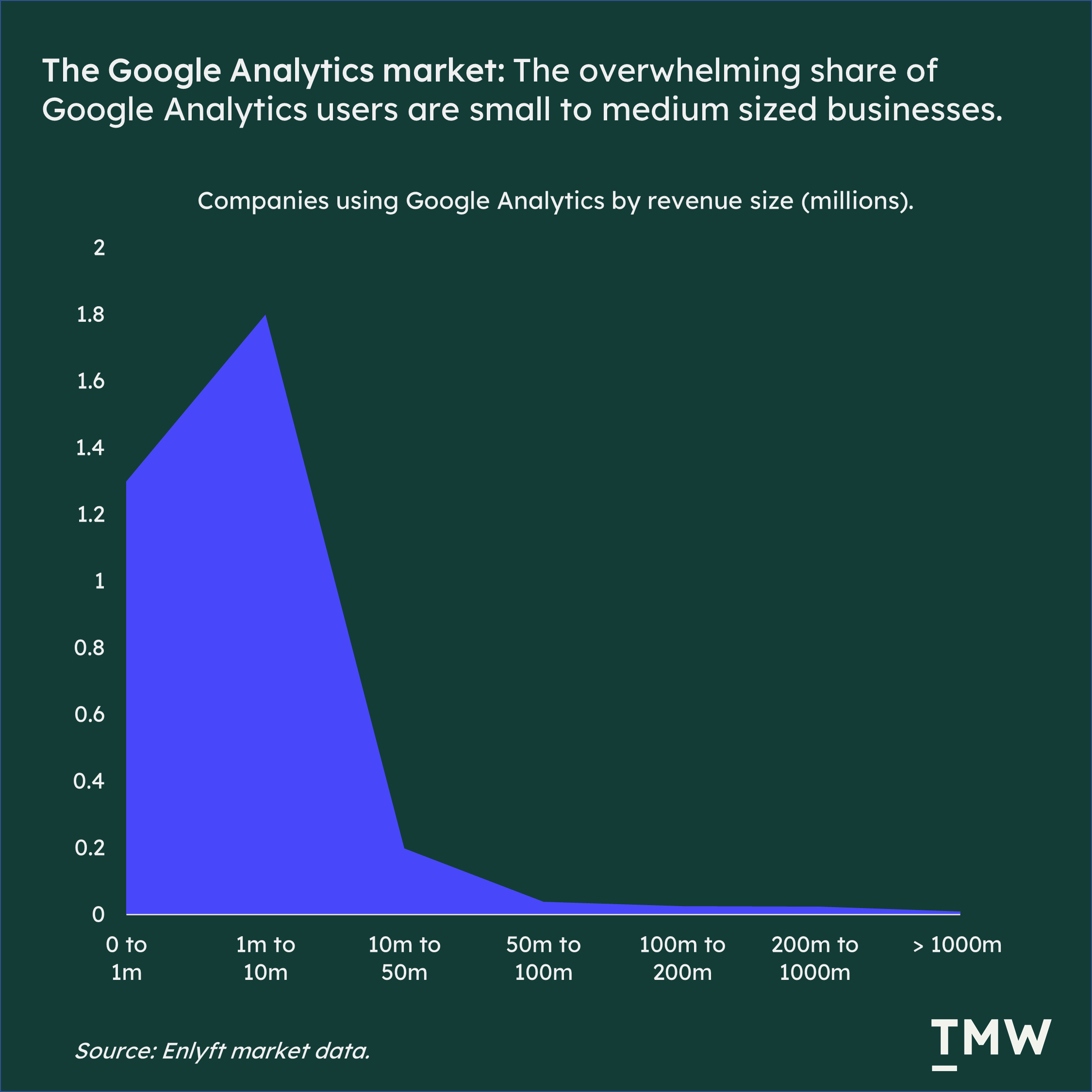
Because of this, more companies than ever are taking segments of the analytics market from Google. This is partly caused by changes in data ethics and the maturing needs of various types of businesses. It’s rare these days to see a product manager rely on Google Analytics to get customer insights. Instead, they might want to use something like HEAP Analytics, Fullstory, Mixpanel, or Amplitude. This is a clear niche in the market that Google has overlooked in its product strategy and one which is being exploited.
The reason for this is that Google’s product strategy is to deliver value for advertisers, and the way Google Analytics was built was to meet these needs. The other change among companies using digital analytics tools is the increasing pressure to conform to a growing privacy regulation environment. One company that is exploiting the transition to a more private web is Plausible, a cookieless and GDPR compliant product that offers the same features of Google Analytics but as a subscription SaaS tool.
Others focus on the more qualitative ways to understand what people are doing on websites to differentiate. Companies like Fullstory and Content Square offer ways to understand the experience of a user by combining hard website metrics with intent signals, friction triggers, and even recording user interactions to try and answer both the “what and why” question of website behavior.
Across both qualitative (why) and quantitative (what) website analytics platforms all the opportunities remain at the enterprise level. The small to medium business market is very crowded and when you have a free tool like Google Analytics that works very well, the ability to compete is very difficult.
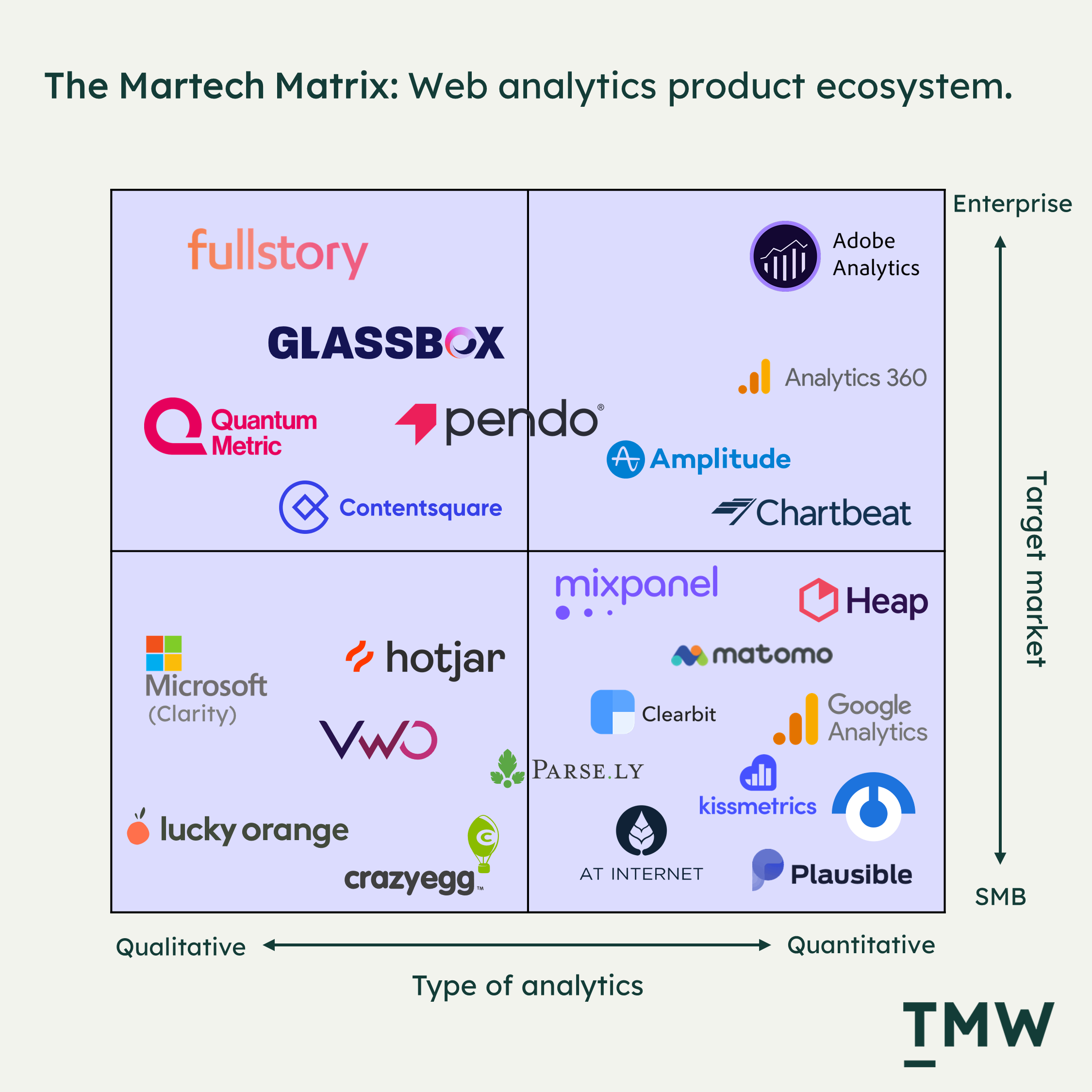
The forced shift to GA4 will likely trigger new startups that can target smaller, digitally reliant brands in various verticals. It would be wonderful to see more web analytics platforms that are geared to eCommerce or publishing specifically as each vertical has different needs and a variety of ways to measure performance. In the near term, it’s hard to see Google Analytics being unseated as the undisputed dominant platform for web analytics, but companies are trying. Y Combinator, the incubator that helped launched analytics startups like Amplitude is seeing increasing amounts of new analytics companies being launched in their network. With Google forcing everyone on the planet to re-platform to GA4, expect more startups trying to seize the day.
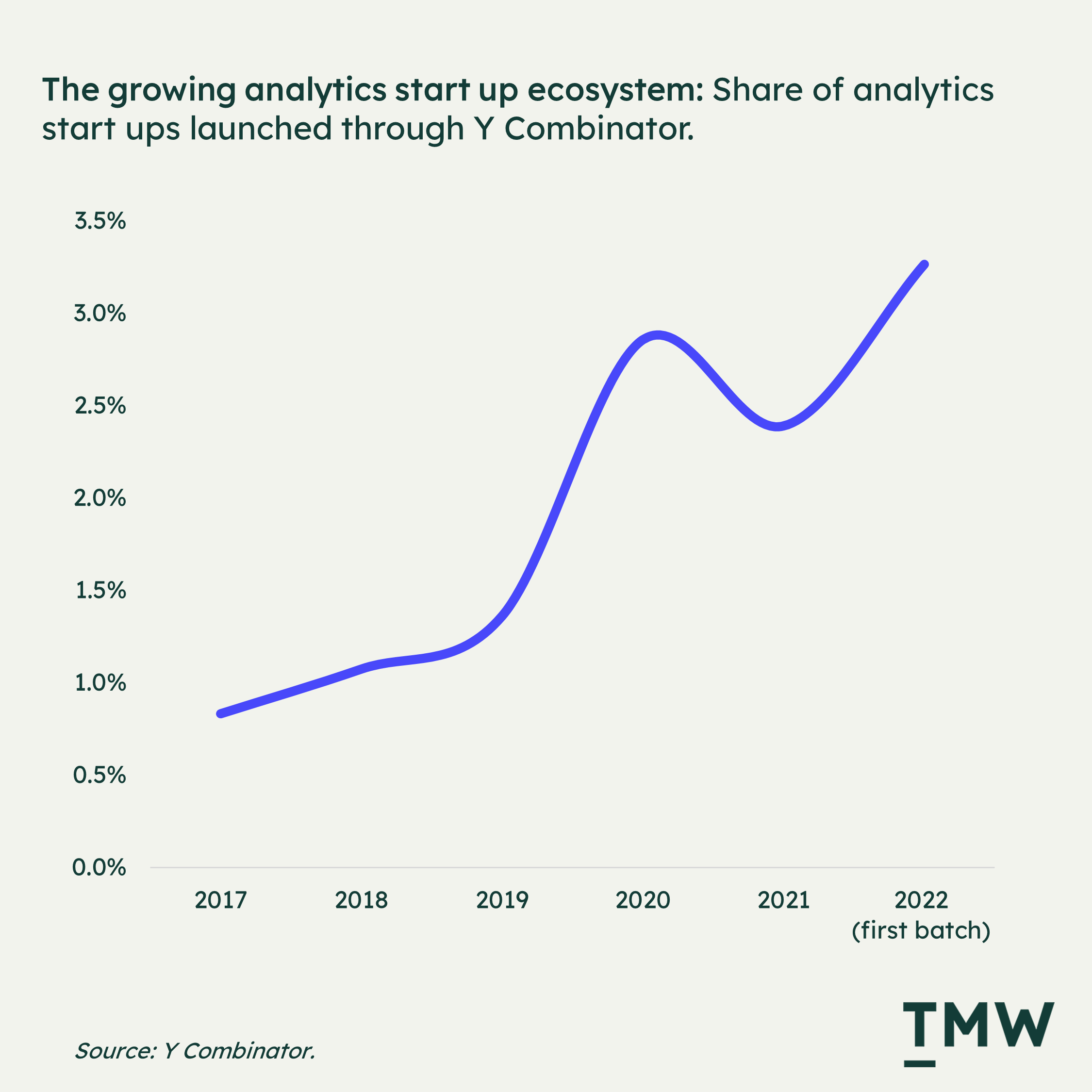
For now, we’ll probably have to endure more complaining while the analytics community starts the great re-platforming. As companies are forced to embrace Google's new vision for analytics with GA4, now, more than ever is an opportunity to rethink how we track users and understand what it means. Links: The great reimplementation.GA4 and going sever-side.What is different with GA4?G2 web analytics marketplace.The Google Analytics market.Cookieless alternatives to Google Analytics.Taking action on GA4.Scott Galloway and Google Analytics.
📈Chart Of The Week
Declining market budgets. Gartner is reporting a significant downturn in CMO spending in 2021 compared to the previous year. This is surprising as 2021 was an overall strong year of general recovery after the onset of the pandemic. 2020 showed us that businesses can still grow without the expensive events and award ceremonies. Link
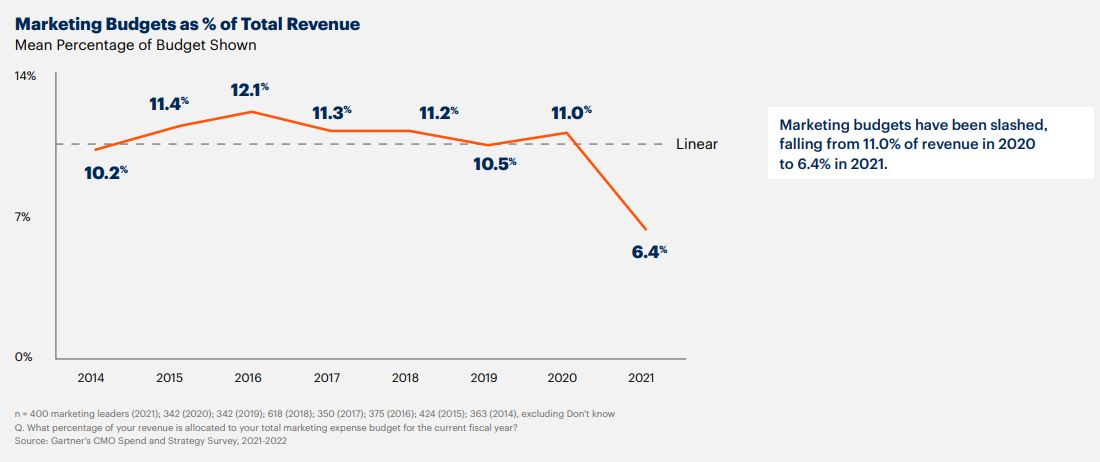
📰 Latest Developments
HubSpot moves to finance the creator economy. In a very interesting move for a B2B software company, Hubspot has announced a fund for online creators. Riding the coattails of their successful podcasting network they are now moving into other content verticals to drive more B2B content creator reliance on their platform and to leverage creators to drive HubSpot’s own reach. Link
Metaverse moves. It’s quite the spectacle to see so many major players in the marketing technology ecosystem embrace the idea of the metaverse. The concept has become the prevailing way to think about innovation in almost every product roadmap, despite there being other major issues for brands to sort out first. The latest to fall under its spell is Adobe, which has a very unique value proposition for digital creation, and Accenture announced its plans to create a business unit dedicated to the metaverse. Links: Adobe. Accenture
This week in high-profile hacks. By now you’ve probably come to see Web3 as highly vulnerable to hacking and theft, but the stories continue to pour out of the space. The latest is perhaps the largest financial infiltration in the history of the internet with Axie infinity having about $600m of crypto tokens hacked. On top of this the most prominent NFT brands such as the Bored Apes Yacht Club and Doodles had their Discord servers hacked, resulting in the managing teams advising users to not click on any link posted in the groups. By the way, Okta was also hit recently with a hack exposing thousands of companies. “Decentralized” or not, cybersecurity will continue to be a significant thread. Links: Axie. BAYC/Doodles. Okta.
📚 Reading
The death of passwords. A deep dive into the next generation of authentication apps that are trying to get rid of the password for good. Link
The talent equation in build vs buy. In most enterprise Martech buying decisions there is always a consideration around whether or not to build capabilities instead of purchasing them. What most people miss is the kind of talent needed to make it happen. Link
Our moral obligations to data. An interesting perspective on the ethical importance of sharing data. So much of our lives our online today, but the data is locked up in massive monopolistic companies, limiting how much academia and next-generation companies can learn and innovate. Link
🔢 Data & Insights
The future of fashion technology. Artificial intelligence is becoming one of the biggest areas of spending across the industry, influencing not just shopping but design, logistics, and customer service. Link
Shifting mobile ad spend. As the reckoning continues from Apple’s ATT mobile impact on advertisers, Appsflyer is estimating that about 25% of global ad spend has shifted from iOS to Android. Link
The state of customer service. One very interesting stat in this report is the declining trend around brands not seeing customer service as a channel to increase growth. Link
💡 Ideas
The billion-dollar browser you’ve never heard of. Who said there can’t be innovation for internet commodities? This company is perhaps the fastest in history to reach a $1 billion valuation, by creating an internet browser for enterprise employees that is focused on cybersecurity. Link
Using AI to build apps. An examination into how OpenAI is now able to take a plain text explanation of an app feature, turn it into code and launch it. Some of the examples here are quite complex like building a game similar to Wordle. Link
Unbundling the CDP. A good rationalization for using point solutions across a data warehouse instead of investing in a packaged CDP solution. The app ecosystems surrounding data warehouses are surprising in how they unlock both flexibility and scalability when using customer data. Link
✨ Weird and Wonderful
Don’t call it cookies. A campaign targeting kids to disassociate online tracking from the idea of cookies. Link
AI-generated faces. A fascinating article tracking a growing way to do outbound sales. Create a fake persona using AI and then automate direct messages on social platforms. I’ve had quite of few of these reach out to me in the past, it’s pretty easy to spot algorithmically generated profile pictures, but this might change. Link
April fools’ day is kind of like Halloween for brands. An analysis of why brands get involved in April Fools' pranks every year and risk massive blowback. It’s about attention. Link
Stay Curious,
Make sense of marketing technology.
Sign up now to get TMW delivered to your inbox every Sunday evening plus an invite to the slack community.
Want to share something interesting or be featured in The Martech Weekly? Drop me a line at juan@themartechweekly.com.
